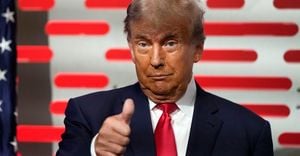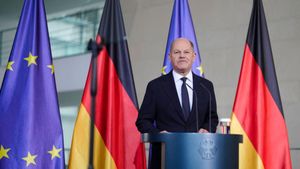The race to dominate the electric vehicle (EV) market has escalated dramatically, particularly as major players like the United States, European Union, and China recalibrate their strategies amid rising tensions and fierce competition. With the prospect of extensive tariffs from both sides—significantly targeting China’s burgeoning EV industry—this rivalry could redefine the global automotive market.
Starting with the recent decision from the White House, significant tariffs have been set on imported Chinese EVs, amounting to 100%. This bold move, announced on May 14, aims to safeguard American manufacturers against what the administration is labeling as China’s unjust trade practices. This rhetoric is echoed across the pond, as the European Commission has also imposed tariffs ranging between 17.4% to 37.6% on Chinese EV manufacturers.
Meanwhile, Canada has not lagged behind, announcing tariffs of 100% on Chinese electric vehicles and 25% on Chinese steel and aluminum exports. These measures are characterized by officials as necessary to shield local jobs and industries from what they view as China’s aggressive market strategy. Proponents of these tariffs argue they are necessary to protect American workers and economies from foreign unfairness.
Chinese officials are pushing back against these accusations. When French President Emmanuel Macron and European Commission President Ursula von der Leyen met with Chinese President Xi Jinping, Xi firmly asserted the non-existence of any “overcapacity problem” in China’s manufacturing sector. He positioned his country as having made significant contributions to the global green transition, emphasizing cooperation rather than confrontation.
The term “overcapacity” has become central to the discourse surrounding the tensions. Critics claim it justifies protectionist policies and serves to shift blame for the West’s longer-term industrial decline onto China.
China's steel and auto industries have been identified as particularly competitive internationally, often sparking allegations of state-backed unfair practices. But the facts present a different story; for example, the utilisation rates of factories and profit margins within China are now comparable to those of Western nations, undermining claims of excessive capacity.
Arnaud Bertrand, a French economic commentator, highlights these points, asserting there is no substantial evidence of overcapacity in China. Instead, he notes, the West’s industrial problems, including reliance on imports and decreasing manufacturing employment, have roots far preceding China’s ascent.
The changes are particularly felt within Europe, where energy prices are soaring post-Russian sanctions. Nations like Germany are facing severe deindustrialization, and companies such as Volkswagen are bracing for significant cuts to jobs across the continent. Consequently, the real issue is less about China’s production capabilities and more about the Western industries' competitiveness.
It’s perhaps here—amidst economic downturn and job cuts—that the political motivations behind such tariffs come to light. By framing China as the villain, Western governments can enact protective measures to shield their domestic firms from international competition. The trade tensions certainly point to how various economies are striving to regain their footing amid globalization’s relentless tide.
From the ground level, the expansion of electric vehicles presents both challenges and opportunities. Ford’s chief executive officer recently visited China to examine the capabilities of local EV manufacturers. He and his CFO were reportedly astounded by the advancements they observed, prompting them to seek their own competitive offerings within the region. Ford's leadership indicates they recognize the rapidly shifting dynamics, as brands like BYD offer cars at remarkably low prices, such as starting at $11,000.
The surge of EVs isn’t just about low manufacturing costs but also implementing intelligent technologies and infrastructure. Chinese automakers are embracing innovations like ‘road-cloud-vehicle’ integration, which connects vehicles to the smart city infrastructure, allowing for safer and more efficient travel. This ambitious program envisions major cities flowing with self-driving vehicles, operated as public transportation instead of private cars—an intriguing glimpse at the future of urban mobility.
Valuable lessons are also gleaned from Chinese advancements. The integration of EV value chains—from raw minerals, necessary for battery production, to the recycling of lithium batteries—illustrates how integrated production systems can yield successful returns. Countrywide systems are being implemented to reclaim resources from used batteries, promising to meet future needs sustainably.
China’s technological advances, juxtaposed with its governmental push for autonomy—especially after criticism aimed at their tech stalwarts like Huawei—reveal its strategic intent; self-sufficiency is now at the core of its industrial philosophy. This approach has fueled rapid developments as the nation transitions to viewing automotive manufacturing as akin to creating sophisticated electronics. The allegorical shift is clear: cars have become “cell phones on wheels”.
The progressive growth of electric vehicle technology isn’t merely competitive; it’s indicative of modern needs for sustainability. With projections showing China holding two-thirds of the world’s solar and wind power projects and rapidly advancing its EV sector, the dynamics could reshape not only the auto industry but also conventional energy structures globally.
Haidong Chen, closely associated with China’s National Innovation Center of Intelligent and Connected Vehicles, states the statistics reflect this shift superbly: New EV penetration stood at 31.6% across the country as of 2023, with growing numbers closing to 50% within major cities. This rise occurred over the short span of ten years, and it positions China front and center within the global automotive market.
Despite the West’s recent actions, the reality for American and European manufacturers is stark; their capacity to compete against the likes of BYD or NIO may hinge on not just price but also efficiency and innovation. Tariffs might buffer the initial sting, but sustained competitiveness will depend on innovation within their industries.
Double-down on investment in sustainable technologies, electric vehicles, and research will be pivotal for manufacturers seeking global leadership. Both the American and European markets must transform how they view not just the economic sectors but also the broader installations of technological advancements affecting environmental policy and infrastructure.
The current developments indicate one thing: electric vehicles are no longer just cars; they symbolize the significant crossroads of economics, technology, and environmental accountability. The world is now witnessing who will drive the future of mobility—where rapid judicial transformations only amplify uncertainty. Will manufacturers adapt quickly enough to retain their foothold? Only time will tell, as the electric vehicle battleground heats up on the international stage.



